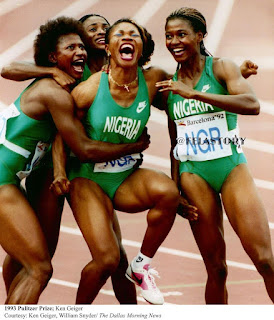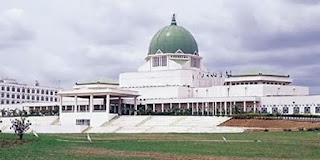The
reactions of Nigerians to our country’s dismal performance at the just
concluded Olympics have been instructive. Nigeria has no medal to its name.
Blessing Okagbare valiantly reached the women’s 100 meters final but placed
eighth. The U.S. Dream Team beat Nigeria 156 – 73, the highest ever margin of
defeat in Olympic basketball history. Many Nigerians have been caustic about
our athletes’ performances perhaps because they had hoped for a sporting
triumph abroad to punctuate the seemingly interminable cycle of dreary news
back home. Yet, both the Nigerian showing and the domestic reaction reveal
widely varying attitudes and beliefs about success.
For
successful countries, success is a science – an outcome empirically determined
by rational systems and structures based on the consistent application of
effort and resources and the cultivation of habits of excellence. For
unsuccessful countries, success is a miracle – a stroke of outrageous fortune;
a whimsical gift from capricious deities; in short, an act of God. To this
mindset, success can be no more predetermined than an earthquake can be
choreographed. Excellence is a magical occurrence originating not from human
exertion but from the realm of the unknown. This outlook explains why our
sports teams customarily show up at international tournaments ill-prepared,
banking on talent and prayer to clinch victory, only to be duly mauled by
better organized teams.
Spain’s
dominance of international football since 2008, to Nigerian eyes, is down to
exceptional luck and a fortuitous surfeit of talent. We forget that throughout
the 1980s and 1990s, Spain was a perennial underachiever. We forget that
Nigeria beat Spain in the France 1998 World Cup. A comparative study of Spain’s
recovery from that low point and the decline of Nigerian football from that
moment will yield empirical data that explains Spanish supremacy and Nigerian
decline. Success is the product of systems established to operate a culture of
excellence. The Olympic medals table is an index of long term strategic
preparation, discipline, research, constantly refined techniques and tactics,
enacted on a systemic and institutional scale.
We
have built no structures to entrench excellence but we demand results that are
completely at variance with our investments. The more our athletes flounder,
the more obdurate we are in our belief that we are entitled to success and the
more biting our critiques of their failures to meet our utterly unrealistic
expectations. In truth, our athletes deserve commendation for even reaching the
Olympics – a feat achieved largely on the strength of their own individual
efforts with minimal or negligible institutional support. Indeed, a Nigerian
medal would only have been a deserved crown for the individual athlete’s hard
work not an achievement to be claimed as a national triumph because it would
not have been the product of any intentional systemic effort.
As
our society has grown more individualistic, we have come to see success as the
product of individual talent and effort alone. But the sheer precociousness of
gifted individuals is not enough. Many prodigies are roaming the streets,
denied the space for self-actualization. It takes institutions to create spaces
for their prodigious gifts to bloom. Michael Phelps and Usain Bolt are
supremely talented athletes and their personal exertions have surely been
justly rewarded. But they are also symbols of systems that work. They are
examples of success by design just as Chidi Imoh, Innocent Egbunike, Mary
Onyali-Omagbemi, Yusuf Alli and Falilat Ogunkoya represent an earlier epoch
when structures existed that, at least, made Nigeria competitive. That epoch
also produced the Super Eagles that won the African Cup of Nations in 1994,
stormed sensationally into the second round of its World Cup debut that year
and won Olympic soccer gold in Atlanta ‘96.
Lionel
Messi, Xavi and Iniesta may be superbly gifted individuals but they represent
the cultural excellence of La Masia, Barcelona’s highly-rated youth academy.
England is launching an U-21 youth league because it has realized that good old
English grit and “getting stuck in” are not enough. If she is to truly compete
with powerhouses like Spain, Germany and Brazil, then young British footballers
have to become technically savvy and tactically aware. This action shows both
the humility to recognize the footballing weaknesses of the “home of football”
as well as the intelligence to mount an institutional response. A decade from
now, when a generation of technically astute English players emerges, it will
not be a product of fortunate happenstance but of strategic preparedness.
In
Nigeria, a culture of planning and strategy is often seen as tantamount to
playing God. But surely, the real folly is arrogantly presuming the certainty
of a miracle to compensate for our habitual negligence, when God is certainly
not a Nigerian. Our conception of
success carries inevitable implications for public life and politics. We persist
in looking for messianic figures to perform miracles in spite of the
dysfunctional environment while resisting the need to actually challenge the
dysfunction itself. We erroneously focus on stumbling upon exceptional
individuals rather than building sustainable institutions. To be sure,
exceptional individuals exist but they are rare. This is why they are
exceptions by definition. The specific historical factors that throw up a
Nelson Mandela or a Lee Kwan Yew cannot be simulated. Institutions are the
golden mean between the undistinguished normality of the masses and the
extraordinary gifts of exceptional geniuses. They enable societies to function
admirably even when they are not led by political prodigies.
Miracles
are permissible metaphors in personal narratives but they are unknown in
nation-building and development. There was nothing at all miraculous about the
so-called Asian Miracle. Asian nations simply married Confucian rigour with
western modernity. China’s ascent is the most compelling example of this
dynamic. Just as the rise of nations is traceable to institutional and cultural
engineering, so too is our decline rooted in the decay of our systems and
values. The youth sports federations that oversaw the sporting successes of
yore have withered away from lack of funding, corruption and inertia. The
inter-school sports contests which nurtured athletes have disappeared replaced
by the heroic but sporadic efforts of a few corporations and individuals to
sustain sports.
But
how much can we really extrapolate from a poor Olympic showing which, let’s
face it, has become customary anyway? Nigeria’s youth bulge carries both the
potential for powering a developmental leap forward as well as the peril of
delinquency, crime and conflict in the face of severely constricted economic
opportunities. Sports harnesses youthful exuberance and energies and can
provide youths with gainful employment, while enabling them to bring honour to
themselves and their country.
Secondly,
in the 21st century, nationalistic belligerence has been replaced by
sporting nationalisms. Countries send their gladiators to duel in the sports arena
rather than the battlefield. Victory boosts national pride and provides a
feel-good factor, the sense of creative optimism societies need to grapple with
the future. A vestige of the prehistoric tribal instinct requires the reality
or fiction of an external adversary against which nations measure themselves
and strive for excellence. The great sporting rivalries between nations derive
from this. Just as Olympics medals tables of the Cold War era reflected the
great power rivalry between the U.S. and the USSR, and between Western Europe
and the Eastern bloc, recent tables reflect the emergent Sino-American
polarity. Nigeria’s decline in sports and other areas is perhaps also down to
the fact that despite our size and natural wealth, we have no conception of
strategic rivals or adversaries. It is also conceivable that investing in
sports and creating theatres of athletic competition will help defuse the
aggressive micronationalisms and militant religiousities captivating youths
across Nigeria. Sports show us that the natural competitive instinct that
undergirds civilization need not be lethal.
(All Images sourced from Google Images)











